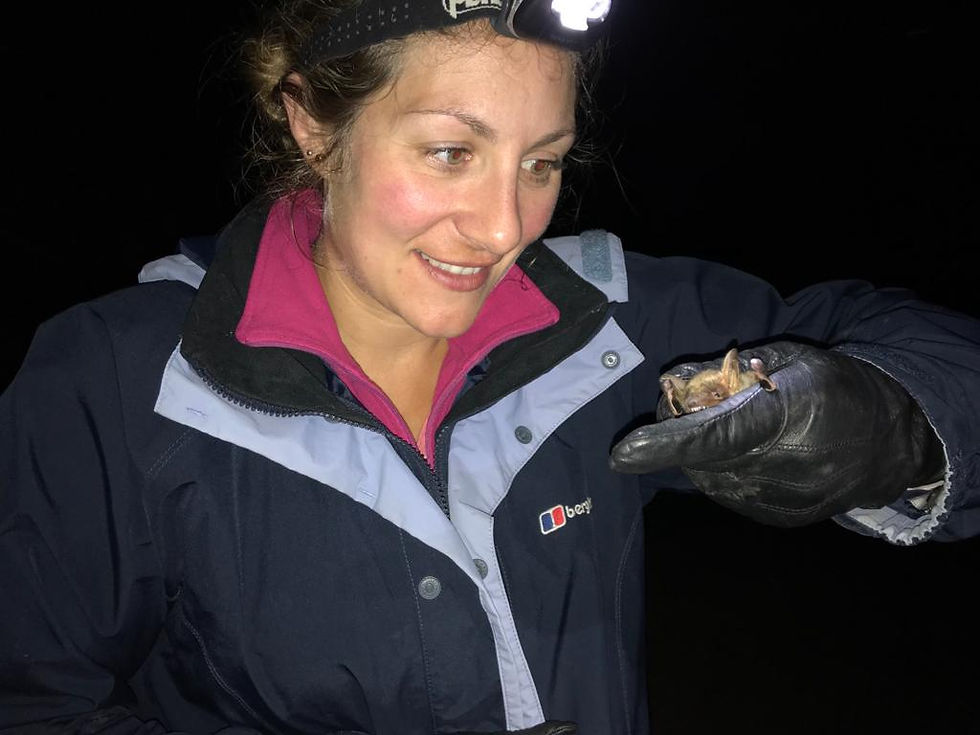Darren Tansley- River catchment coordinator and wild about Water Voles!
- Katie

- Jul 7, 2020
- 4 min read
Todays Q&A we have one of the coolest dudes in Essex- Darren Tansley! Talking to us about his career in river conservation and his passion for semi-aquatic mammals!
Short bio about yourself and your career:
I am the River Catchment Coordinator at Essex Wildlife Trust but I started working at EWT in 2007 on a three year contract as Water for Wildlife Officer to set up a Water Vole Recovery Project for the county. I am the Chair of the UK Water Vole Steering Group on behalf of The Wildlife Trusts, a role I was offered in 2016 after the retirement of Alastair Driver, the Environment Agency’s National Biodiversity Manager.
In 2001 I was a founder member of the Essex and Suffolk Dormouse Group which had about 9 members at the time. This has now expanded to dozens of trained surveyors with groups all over both counties and more than 50 new dormouse populations discovered.
In 2014 I co-authored the revised Mammals of Essex book in collaboration with Essex Mammal Recorder John Dobson. This was also the year I went to Gloustershire to train to be a badger vaccinator with APHA.
Although I have a wide ranging interest in all wildlife I have always been particularly interested in Mammals and I specialise in semi-aquatic species such as otters, mink, water vole and water shrew. In 2018 I was invited to be the ecologist on the application for an enclosed beaver release at Spains Hall in Finchingfield and have been working with the Landscape Conservation Team to monitor progress on site since the release in March 2019.

How did your career begin?
This is my second career (I was a touring and recording musician in my 20s and early 30s) so I started late. I had been volunteering with Greenpeace since I was 17 and was involved with seal rescue during the North Sea phocine distemper outbreak that killed thousands of these animals in 1988-89 so in 1998 I decided to get a job at Essex Wildlife Trust. However I didn’t have any qualifications so they said I wouldn’t be considered for an interview. That afternoon I enrolled on a Conservation Management Degree at Otley college and graduated in the summer of 2001.
I spent 6 more years volunteering and taking on freelance environmental surveys for Suffolk Wildlife trust, London Wildlife Trust, the Essex Mammal Group and the RSPB then when I had surveyed every river in Essex I applied for the Water for Wildlife Job at EWT. By then I knew all the Water for Wildlife Officers in the other Wildlife Trusts in the region so they were all pleased that Essex was going to be able to work with them.


What does your job entail?
I get bored very quickly so I’m glad to say it involves everything. Because in my previous career I had to do print and broadcast media interviews I quickly started getting involved with doing these for Essex Wildlife Trust and also for the National Wildlife Trusts, usually talking about mammals or rivers. But my main job involves restoring rivers to a more natural state, protecting or reintroducing species such as water vole or beaver, looking for natural solutions to flood and water management and looking at strategic solutions to conservation issues at a landscape scale. I work on Regional and National scale projects as well as those local to Essex. I also run a number of training courses for adults including species surveying, tracks and signs and more recently, eDNA sampling for our volunteer River Wardens.
Please highlight a conservation issue you are particularly involved in:
I am known for my work on Water Vole Recovery at a local, regional and national level. I reviewed and contributed material to the latest Water Vole Mitigation Handbook and the PTES guide for landowners “Helping water Voles on your Land”. I also helped design the National Water Vole Monitoring Programme which has been running for 5 years. Water voles are still in decline so they need all the help they can get.
What can people do to help with this issue?
The main thing is to manage waterways in a sympathetic way. Let vegetation grow around streams, ponds, rivers and brooks so that water voles have cover from predators and plenty to feed on. Unlike otters, water voles can live in pretty polluted water, but obviously we’d prefer they didn’t have to so don’t put anything down the sink or drain that could run into the rivers. But the biggest threat to water voles today is invasive North American Mink. We need any records of this species as soon as they are seen. Many of our volunteer river wardens help by adopting a floating monitoring raft that sits in the river and records footprints of all the animals that go onto it including mink.
How did you get into river conservation?
I have always loved the rivers since I was a child when we had a makeshift raft on the River Stour in the Dedham Vale. When I was introduced to water vole radio tracking at college I suddenly realised that was something I could do to help not only the river I grew up on, but others across the county. After graduating I missed the learning so joined the Mammal Society and went to a conference where I met Louise Wells from London Wildlife Trust. She offered me my first paid water vole surveys and from there I was hooked.
What is your greatest achievement?
Reintroducing water voles to the River Colne after they became extinct.
What is your favourite species?
Take a guess, although otters come a very close second.
What advice do you have for people wanting to pursue a career in conservation?
Volunteer, volunteer, volunteer!




Comments